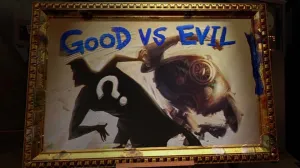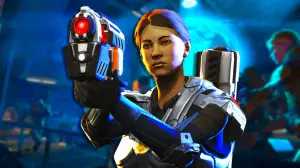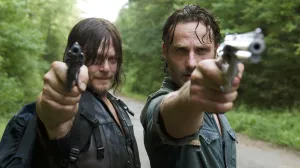
The first season of AMC’s martial arts drama Into the Badlands has just concluded, and ended with a number of lingering plot.
Videos by ComicBook.com
But with no official renewal announcement from AMC as of yet, will fans ever know what becomes of these characters? Does Tilda kill the Widow? Who are these super powered abbots, and what do they want with M.K.? What’s going on at the Fort, and where is the River King taking Sunny?
ComicBook.com spoke to the Into the Badlands showrunner, Al Gough and Miles Millar, about the show’s first six episodes, and what fans can expect from the future.
After seeing the season finale, I think the first question on every viewers mind is, “Have you guys heard word about a Season 2 renewal for Into the Badlands?
Al Gough: We haven’t gotten anything official yet. We know that the network is obviously very happy with the show and how it’s performing, but we haven’t gotten official word of a pickup.
Going into season one, what were some of the major themes that you wanted to explore? The difference between nature and the ability to choose your own destiny seems to be a big one. I was wondering what you think viewers might take away from the show concerning that them.
Miles Millar: That’s very accurate in terms of the theme. Plus, a guiding theme through the show is weakness and strength. It’s also about physical, emotional, and spiritual enslavement and breaking free of those all.
Al Gough: Yeah, your nature versus your ability to change. In this first season, it’s really Sunny kind of waking up to the world he’s in. He’s sort of been indoctrinated into this world at a very young age. He’s very much part of the power structure, and actually helps enforce the power structure. He’s been sort of under Quinn’s thrall for most of his life. This season is really about his sort of awakening. It happens through, not only his relationship with Veil, he finds out he’s going to be a father, and that’s something that’s forbidden for him. Also with M.K., because it’s a serious boy with some serious power who may have a link to his past. I think you see, certainly when he gets to the end of the season, he sees Quinn for what he is, and puts a sword through him and tells him he’s going to be in a last tattoo.
I think its Sunny trying to change. Then the question is, which Waldo brings up very early on, “Can you escape who you are?” I think that’s always going to be Sunny’s dilemma, which is even if he’s physically trying to leave the Badlands, can he ever actually escape who he is? That’s one of the big scenes of the series. It’s sort of this idea of spiritual enlightenment, and can you change. The change isn’t going to come from this sort of changing your logistics, it’s really sort of an awakening inside yourself. I think that’s something that you could begin to see Sunny waking up to in this season. By the end of it, because of that, he’s been stripped of everything. His title, his rank, he’s lost the people he cares about. He’s practically beaten to a pulp. Now that all of those sort of outside signs of strength have been stripped away, what does that mean?
In a way, it’s like as he becomes stronger in spirit, but to the outside world it looks like he’s been weakened. I think that’s something that will follow him. All the characters go through that. What’s their internal strength versus their external strength? You’d look at someone like Veil. She’s pregnant, she’s a doctor. She certainly didn’t use any martial arts or demonstrate any fighting skills in this season. Doesn’t mean she doesn’t necessarily have them, but she doesn’t seem to. She seems sort of vulnerable, but she’s actually very strong. At the end of the season, when she basically offers Tilda a way out that could potentially kill The Widow, you see that there’s a darkness and a corruption in the Badlands that gets to everybody at a certain point. How do you sort of fight that?
It was really interesting that M.K.’s story this season essentially ended with him in the same position he was in at the start of the season, which is locked in trunk. How far along in the creative process was it that you realized, “Oh, I know what we’re going to do with M.K. Put him back in the box?”
Al Gough: Basically, that’s what we wanted to do with M.K. He literally comes out of the box at the beginning of the season, and goes back in one at the end. You don’t know where he’s going. You don’t know the intentions of these abbots. Like everybody else in the Badlands, there’s a lot of moral ambiguity. Whether they’re good or bad really depends on who you are and your point of view.
Miles MIllar: M.K. symbolizes dominant the opportunity of escape. Obviously, at the end of the pilot, obviously the opportunity for escape is completely gone. The idea of confining M.K. also symbolizes that.
Al Gough: They were both looking for kind of the easy way out. At the end it blew up in their face. Now they’re both worse off than they were at the beginning of the season.
Could you tell us a bit about this Totemist religion that Lydia’s father, Penrith, practices, and what those totems mean to them?
Al Gough: We actually have two religions in the Badlands. You see the Totemist, which is what Penrith represents and what Lydia was. The idea is that it’s a little combination of voodoo and Eastern religion. The idea that you can make these totems and that they represent these people who are very strong and that you have these ties to. Then, once you break those totems, those ties have been broken. Again, the idea that even in this world which appears godless, there are … Like there were religions during communist Russia. It’s always there, and people are always seeking it. They’re always looking for it, and when Penrith says the Barons have sort of set themselves up as false gods and he at least says that he’s looking for the true path to spirituality, though clearly, again, there’s a darkness to him. He knows these abbots, what is their intention? There’s always that moral gray area.
Miles MIllar: You know, obviously, the show is very loosely based on Journey to the West, this famous classic novel of Chinese literature. The idea at its core, if we’re serious, is this idea of the journey to spiritual enlightenment. That path for both M.K. and Sunny is going to be full of danger. We really wanted to represent some form of religion in this world that connects Sunny and M.K. to the world of the Barons. It’s something that we think is intriguing, and obviously we’ll be able to lay out and really explore in season two.
It feels like there’s been a lot of world building, especially towards the end of this season. This season felt really focused on the territories of The Widow and Quinn, and on the hand-to-hand martial arts combat, but at the end of the season many of these characters scattered to the wind, and we have the introduction of these supernaturally gifted abbots in this really incredible fight scene. I’m wondering how eager you guys are to explore these new areas and concepts, possibly even beyond Badlands with Sunny, and really build out this world and what audiences. What should fans look forward to, from that angle, in Season 2?
Al Gough: I think in this season, because again, it was six episodes, we wanted people to be immersed in the world and understand this part of the world, set up the political structure and have an understanding before kicking the doors down at the end of the season with the promise of seeing more of the Badlands. In season two, you’ll meet more Barons. We’ll explore the abbots. We’ll explore other areas of the Badlands. Even though Sunny and M.K. look like they’re being taken far away, Sunny’s goal is going to be to get back to Veil and find M.K. Ultimately, it becomes what the series is called, Into the Badlands. Then, when you go into the Badlands, when you’re not a regent, when you don’t have Clippers, even though you’re Sunny and you clearly have proven time and time again you can take out a lot of people, there’s a lot of threats that will be coming at you. Everything you’ve done in your life, all of those tattoos on your back have consequences attached to them. You’ll definitely see more of the Badlands in season two, and really start to see the journey, the literal journey of these characters.
At the end of the season, we see Lydia has left, Baron Quinn is gone. That leaves Jade and…I think Ryder survives that last fight?
Miles MIllar: Ryder runs off.
Al Gough: Yeah, you see Ryder’s run off. There’s Jade. Quinn is questionable. if he survived or not. You definitely see that this real power structure in the Badlands, it’s a big hit for this. That is going to lead to a lot of chaos and a lot of power grabbing in season two.
What kind of state is the Fort left in now? Is Jade the only remaining authority?
Al Gough: You’ll have to wait for season two.
Do you think of The Widow as the villain of this story, or at least this season?
Al Gough: I think with all of these characters, there is more going on than being painted as just certainly good guys and bad guys, heroes and villains. I think with The Widow, you see somebody who was in a bad situation. She got herself out of it, and she’s trying to empower these young women. The fact of the matter is, in many ways, she’s doing to these girls just what Quinn does to the Colts and the Clippers, which is to turn them into killers. Her justification is the justification of, quite frankly, any sort of dictator or terrorist, which is, we’re fighting for a world where our point of view is supreme. “We,” being her and those girls, are the tip of the spear, so that justifies their actions. Again, what she might be fighting for, or her ultimate goal may be noble, but her methods are just as violent as those of the other barons.
Obviously, you’ve seen her in several fights this season. It’s like she doesn’t spare anybody. She’s not somebody to be messed with. I think a lot of people, as they go through the season, your first introduction to her was really in a way through the eyes of Sunny and Quinn in terms of talking about her, as, “She’s a problem for us,” and, “She’s a threat.” What does she want with M.K, who is this character we like, and she clearly has some knowledge of what his secret is? You realize more of that in that last scene with her. Then, I think, through the course of the season, it has been fun to watch people embrace her. Not only because she’s a bad ass and she’s an amazing fighter, but also because she does have this point of view that people can get behind and understand. She does have this very complex mother-daughter relationship with Tilda, and Tilda’s somebody who you see questioning The Widow and what she does. Veil gives her an opportunity to break out of that at the end in a very extreme way. I think she’s a character who’s got a lot of secrets and a lot of sides. We’ll continue to explore that in season two and beyond.
Into that Badlands has a very diverse cast. You’ve got Daniel Wu as your lead. You’ve got the main antagonist, if not villain, of this season has been The Widow, who is a woman. Possibly my favorite character is Waldo, who is in a wheelchair, but is a complete and utter bad ass whenever you see him on the screen. I was wondering what the fan reaction to seeing these kind of unconventional leads and unconventional heroes has been.
Miles MIllar: The fan reaction’s been incredibly strong. The show’s very instinctive, it’s very different, it’s very original. I think people are craving something like that. They’re bored and sick of seeing the same old things. Remakes and reboots. This is something that they haven’t seen before. They don’t know where it’s going, they don’t know the ending. They don’t know the next chapter. I think that is something that is missing from television. They are missing this genre television. It’s based on other things.
Al Gough: Also, one of the reasons that we set it far in the future was so that things like race and gender weren’t really issues. It was really all about strength and weakness. That was something that which was important. Also, martial arts as a genre, and martial arts films are also a great equalizer. You can have female characters who are just as powerful. When you throw up Sunny and The Widow, people are like, “Who’s going to win that fight?” There was a big question mark there, because she’s so good. I think martial arts is the great equalizer as a genre of the fighting form. I think something that we tried to do. There’s Jacobee, who is Black, and The River King is Black. It’s a very diverse world, and that’s by design. That’s something that we definitely wanted to do because it’s also the future. We really wanted to really embrace that aspect.
That’s similar to how people talk about Star Trek, and how that show envisioned a future, where all of these old prejudices are gone. I like thinking of Into the Badlands now as a post-apocalyptic, martial arts infused, Star Trek kind of world.
Al Gough: Yeah, look at the original series now. It was so ahead at the time in so many ways. You sometimes wonder those fights and the conversations and everything that must have gone on behind the scenes in order to achieve that in the 60s. It’s pretty incredible that you’ve got an African-American woman, and you’ve got an Asian man, and you’ve got, also my favorite, Chekov. You literally have a Russian in the middle of the Cold War as a good guy on the deck of the Enterprise. It’s quite amazing. That’s what science fiction can do. I think that’s really … It always comments on the world, but also helps you see a world that doesn’t exist yet for you.
Are there any last messages you want to send to the Into the Badlands fans out there about this season or the possible next?
Al Gough: We just appreciate them watching, and have faith that there’ll be a season two. Please tell all your friends who didn’t watch it on AMC to watch it on the various platforms that it’s playing on!








